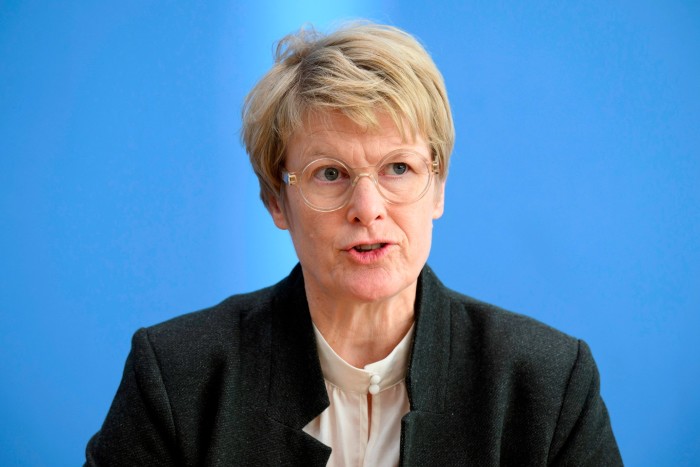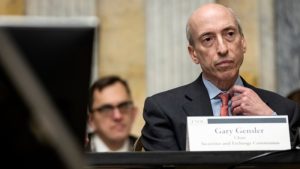Germany’s top economic panel gripped by strife amid internal lawsuit

Unlock the Editor’s Digest for free
Roula Khalaf, Editor of the FT, selects her favourite stories in this weekly newsletter.
A bitter legal dispute has broken out among Germany’s top economic advisers — prompted not by policy disagreements over how to overcome the malaise gripping Europe’s powerhouse but by an internal ethics code.
As the Council of Economic Experts puts the final touches on its report due to be presented to Chancellor Olaf Scholz on November 13, one of the five academics on the panel has taken the other colleagues to court.
Veronika Grimm, a professor for energy economics at University of Nuremberg and member of the council since 2020, sued the four other members for having adopted transparency rules against her will this year.
Grimm is arguing that the guidelines on how to deal with alleged conflicts of interest are invalid and violate her rights enshrined in federal law, a spokeswoman of Wiesbaden administrative court told the Financial Times.
“The public quarrel is highly damaging to the institution,” Volker Wieland, a council member from 2013 to 2022, told the FT. “It undermines its credibility and hinders effective collaboration at a time when a critical assessment of the government’s economic policies would be much needed.”
Founded in 1963 at the behest of Germany’s first economics minister, Ludwig Erhard, the council at times was a crucial driver of economic debate. In the 1970s, it was one of the first global voices in favour of supply-side economics — lower taxes and less government interference in the economy. In 2002, its annual report offered a blueprint for labour market reforms enacted by chancellor Gerhard Schröder the following year.

The lawsuit is the latest escalation in an acrimonious tussle over Grimm joining the supervisory board of Siemens Energy, a blue-chip company that makes wind and gas turbines and kit for utilities and grids.
The council’s chair, Monika Schnitzer, and the three other members repeatedly warned that Grimm joining the board could create a potential conflict of interest, pointing to the council’s work on energy transition and decarbonisation. When Grimm nonetheless accepted the mandate, her colleagues urged her to resign, which she also ignored.
Grimm declined to comment.
The Wiesbaden court, which received the case in July, has yet to set a date for a hearing. WirtschaftsWoche reported about the court case first.
According to people familiar with Grimm’s arguments, she claims that federal law underpins the council’s work, given that its members are appointed by the German president.
Under the law, only government officials and members of business lobby groups, employer associations and trade unions are prohibited from joining the council. Grimm also pointed out that several council members in the past did hold seats on supervisory boards, including former chair Wolfgang Franz at utility EnBW, the people said.
Schnitzer told the FT that the council adopted its transparency code because it needed “internal rules” to guarantee it “is perceived as independent”.

Potential conflicts of interest were supposed to be “internally disclosed and discussed” and the code did not define “procedures which can lead to the expulsion of a member”, Schnitzer said. Since the code is confidential, the FT was unable to independently verify these claims.
The council has been gripped by rancorous disputes before. In the most famous row, Wolfgang Stützel resigned in 1968 after his colleagues rejected his minority views on exchange rate policy. An arbitration court ruled years later that they did violate Stützel’s rights.
“In the short run, such disputes have always damaged the council’s reputation,” said Lino Wehrheim, a historian who has analysed its influence and pointed out that the panel “always recovered” as time passed. “After 10 years or so, everyone will have forgotten about this,” he said.
Wieland stressed that transparency rules “can be useful” but needed to be backed by all members. He argued that Grimm did not “do anything that she is not legally entitled to” and suggested that the majority’s response came close to “bullying”.
“This begs the questions whether other motives are behind it,” he said, pointing out that Grimm disagreed with the majority on policy issues. “[She] has been more critical of the governments’ decisions on fiscal matters and other areas.”
The German economics ministry, in charge of the government’s interactions with the council, told the FT that it welcomed the ethics code “in principle” but was not aware of its details. It added there were no plans to change existing legislation in order to formally ban council members from taking seats on supervisory boards.
Schnitzer said the legal tussle had no repercussions for the think-tank’s work. “In spite of the internal dispute over the code, we are working on the next annual report jointly and in a professional manner.”
#Germanys #top #economic #panel #gripped #strife #internal #lawsuit






